- Region
- Águilas
- Alhama de Murcia
- Jumilla
- Lorca
- Los Alcázares
- Mazarrón
- San Javier
-
ALL AREAS & TOWNS
- AREAS
- SOUTH WEST
- MAR MENOR
- MURCIA CITY & CENTRAL
- NORTH & NORTH WEST
- TOWNS
- Abanilla
- Abarán
- Aguilas
- Alamillo
- Alcantarilla
- Aledo
- Alhama de Murcia
- Archena
- Balsicas
- Blanca
- Bolnuevo
- Bullas
- Cañadas del Romero
- Cabo de Palos
- Calasparra
- Camping Bolnuevo
- Campo De Ricote
- Camposol
- Canada De La Lena
- Caravaca de la Cruz
- Cartagena
- Cehegin
- Ceuti
- Cieza
- Condado de Alhama
- Corvera
- Costa Cálida
- Cuevas De Almanzora
- Cuevas de Reyllo
- El Carmoli
- El Mojon
- El Molino (Puerto Lumbreras)
- El Pareton / Cantareros
- El Raso
- El Valle Golf Resort
- Fortuna
- Fuente Alamo
- Hacienda del Alamo Golf Resort
- Hacienda Riquelme Golf Resort
- Isla Plana
- Islas Menores & Mar de Cristal
- Jumilla
- La Azohia
- La Charca
- La Manga Club
- La Manga del Mar Menor
- La Pinilla
- La Puebla
- La Torre
- La Torre Golf Resort
- La Unión
- Las Palas
- Las Ramblas
- Las Ramblas Golf
- Las Torres de Cotillas
- Leiva
- Librilla
- Lo Pagan
- Lo Santiago
- Lorca
- Lorquí
- Los Alcázares
- Los Balcones
- Los Belones
- Los Canovas
- Los Nietos
- Los Perez (Tallante)
- Los Urrutias
- Los Ventorrillos
- Mar De Cristal
- Mar Menor
- Mar Menor Golf Resort
- Mazarrón
- Mazarrón Country Club
- Molina de Segura
- Moratalla
- Mula
- Murcia City
- Murcia Property
- Pareton
- Peraleja Golf Resort
- Perin
- Pilar de la Horadada
- Pinar de Campoverde
- Pinoso
- Playa Honda
- Playa Honda / Playa Paraíso
- Pliego
- Portmán
- Pozo Estrecho
- Puerto de Mazarrón
- Puerto Lumbreras
- Puntas De Calnegre
- Region of Murcia
- Ricote
- Roda Golf Resort
- Roldan
- Roldan and Lo Ferro
- San Javier
- San Pedro del Pinatar
- Santiago de la Ribera
- Sierra Espuña
- Sucina
- Tallante
- Terrazas de la Torre Golf Resort
- Torre Pacheco
- Totana
- What's On Weekly Bulletin
- Yecla


- EDITIONS:
 Spanish News Today
Spanish News Today
 Alicante Today
Alicante Today
 Andalucia Today
Andalucia Today
article_detail
Spanish News Today Editors Roundup Weekly Bulletin July 14
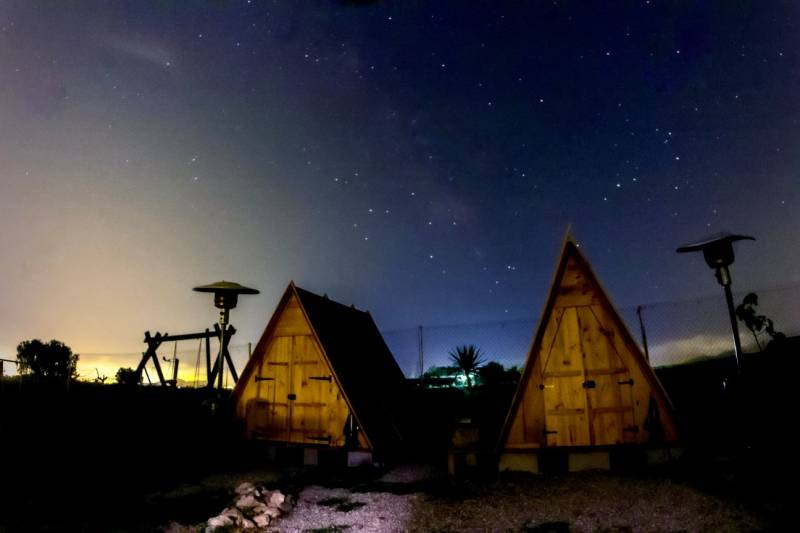
FEATURED ARTICLES: "All the supermoons and meteor showers you can see in the night sky this summer!" and "Spanish motorways to become toll roads in 2024?"
Thanks for coming back to read your Editor’s Roundup Weekly Subscription Bulletin for another week. It’s a pleasure to know you enjoy it, and makes it worth all the hard work we put in to pull it together each Friday.
To ensure that we are offering you the best possible service and to continue to count on your support for this bulletin, we want to hear your feedback. What bits of your weekly bulletin do you especially like and what bits do you normally skip over? Which topics do you find most interesting and which parts could you do without? Where are you based and would you like to see more local items included?
Send us your gripes and your groans, your thumbs up and your praise, to editor@spaintodayonline.com and we’ll do our best to accommodate what you all want to the best of our abilities.
In this week’s ‘star-studded’ issue, we’ve got well-near a galaxy full of supermoons and shooting stars for you, plus stop signs, singing sensations and more…
Over the moon
It’s something wondrous to be able to sit on your balcony or terrace with a cool drink (and your anti-mosquito candle/zapper/device of choice turned on max) and to look up at the night sky on these clear summer evenings, when you can see the bright shining full moon reflecting the season’s searing sun, and maybe even catch a glimpse of a shooting star or the pulsating light of a distant planet, minding its own business on the other end of the cosmos.
We’re lucky enough to have several major astronomical events coming up this summer which will be visible in the night sky in Spain and which you definitely won’t want to miss.
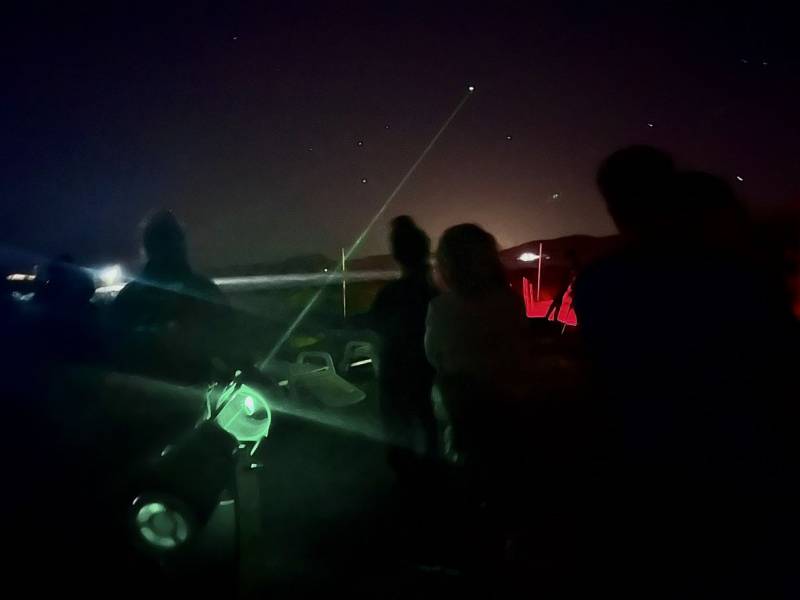
This year’s summer ‘stargazing’ season already started with a bang as there was a Supermoon on July 3. A Supermoon is the name given to a full moon or a new moon that coincides with perigee – the closest that the Moon comes to the Earth in its elliptic orbit. Which basically means that the moon will look larger than usual and shine brighter.
For those who missed the Supermoon at the start of this month there’s good news as three more are coming up this summer on August 1, August 31 and September 29.
Supermoons give us the chance to see the Earth’s natural satellite in a whole new light, in a manner of speaking, and get great views of its surface, especially if you use a telescope.
Even better, the Supermoon at the end of August is going to be a very rare Blue Moon Supermoon! What does that mean, exactly?
Well, a Blue Moon refers to a full moon that appears in our sky for the second time in the same month. Since the moon is full every 28 days, it’s quite a rare occurrence to have two in the period of just one 28-, 30- or 31-day month.
Blue Moons are so rare they only occur about once every 33 months, which is the about the same as seven times every 19 years or just 41 times per century… hence the well-known expression “once in a blue moon”!
Beyond the moon lie the stars, and this summer there’s no shortage of chances to get incredible views of the stars in the night sky.
Monday July 17 marks the beginning of the biggest Meteor Shower of the year, which will last until August 24.
The Perseids Meteor Shower, known poetically in Spain as ‘Lagrimas de San Lorenzo’ or Saint Laurence’s Tears, will be at their peak on August 11, 12 and 13, when we can expect to be able to see up to 100 meteors per hour!
As if all this weren’t enough, throughout the whole summer, you can enjoy the breathtaking sight of the centre of our own galaxy, the Milky Way, and the most spectacular distant objects within it.
Next Friday, July 21, will bring the first appearance of Saturn in our evening sky. The planet will be visible with all its magnificent rings and the moons orbiting it.
And as the summer days grow to an end, the universe will give us one final goodbye party thanks to the increased visibility of our closest neighbouring galaxy, Andromeda, in mid-September. Again, best viewed with a powerful telescope.
STOP, look, listen and pay

The General Directorate of Traffic (DGT) – Spain’s all-seeing, all-powerful traffic and roads authority – has an endless number of systems to monitor the roads and driver behaviour that can spot even the most minor of offences. But this week they’ve alerted motorists of one more measure designed to keep them in line: cameras at STOP signs.
When we’re familiar with an area and the traffic flow, most drivers tend to slow down when approaching these signals but then cruise on by if the road is clear. Now, these new cameras will instantly spot vehicles that don’t come to a complete stop and fine the driver 200 euros, as well as taking four points from their driving licence. (Remember, in Spain points are taken OFF your licence rather than being added on.)
There’s good reason for this crackdown though, since driving through a STOP sign has become one of the most common motoring offences in Spain after speeding, failing to maintain a safe distance, incorrectly entering the opposite lane and not giving way at the appropriate time.
And according to the traffic authorities, more than 1,000 drivers lost their lives in 2021 as a result of ignoring STOP signs.
In a similar vein, the traffic authorities will be keeping an eye on people merging with a main road too soon by crossing over a continuous white line instead of waiting for the broken line. Cameras along these stretches are capable of reading licence plates of cars that are travelling in the joining lane, and thus can quickly determine if they’ve merged with the main road ahead of time.
This infraction will also result in a 200-euro fine but drivers won’t lose any points from their licence.
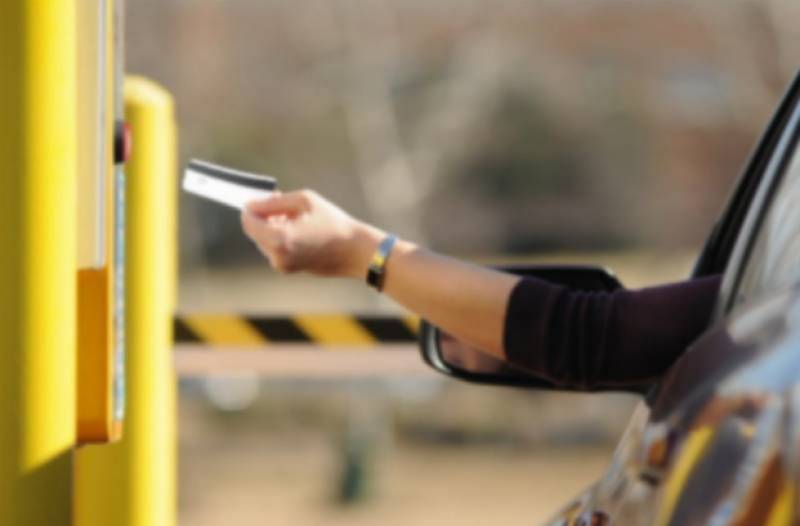 The DGT have also insisted this week that all of Spain’s motorways (autovías) will be toll roads and that drivers will have to pay to use them by the end of 2024. This is despite President Pedro Sánchez openly denying the truth of this in a head-to-head debate with PP presidential candidate Alberto Núñez Feijóo on Monday.
The DGT have also insisted this week that all of Spain’s motorways (autovías) will be toll roads and that drivers will have to pay to use them by the end of 2024. This is despite President Pedro Sánchez openly denying the truth of this in a head-to-head debate with PP presidential candidate Alberto Núñez Feijóo on Monday.As the leaders of the country’s two largest political parties, the two men are battling it out to win the general election on Sunday July 23. And the friction caused by this dispute over whether Spain will have toll roads or not has everyone in a muddle.
While the head of the DGT, Pere Navarro, explained that by “next year, as imposed by Brussels, we will have to build tolls, Brussels demands it of us”, he later back-pedalled and said that it’s really not his call, creating even more confusion.
So, unburdened by the political bickering, is it true that Spain will have tolls on dual carriageways in 2024 or not?
Well, the short and frustrating answer is that nobody is quite sure. Yes, the EU has stipulated that the Spanish government must do more to cover the costs of road maintenance, which in essence means by charging users.
Yet the government has pushed back introducing any measures until the financial climate in Spain stabilises. One way or another, whether it’s next year or the year after, the fact of the matter is that Spain will need to honour its commitment to the EU’s Transformation and Resilience Plan by developing tolls at some point if it is to continue to benefit from the 140 billion euros in European funds.
Don’t forget to join our Driving in Spain Facebook group for regular motoring and travel updates
Headless toddler found on Spanish beach
All of Spain was left reeling this week when the shocking story emerged of a decapitated body of a baby which had washed up on a beach in Tarragona, Catalonia. A council cleaner made the grim discovery on Tuesday July 11 as he walked along the Roda de Berà seafront.
Distressingly, several other strollers had passed by the corpse the evening before but had ignored it, believing it was a discarded doll.
After a few hours the remains were moved to a medical facility where a preliminary post-mortem has revealed that the body is that of a little girl, less than six months old, who had been in the water between 15 days and two weeks.
The fact that the infant was discovered without a head and with the upper part of her torso missing makes further identification extremely difficult, but experts are currently trying to discover her country of origin.
With this scant information, the Guardia Civil is pursuing a number of different theories. Officers are currently checking the sea currents of the last few months to figure out where the baby might first have fallen or been thrown into the sea, and investigators are examining reports of shipwrecks in the Mediterranean over the past two months.
On the other hand, mayor of Roda de Berà Pere Virgili has suggested that the child may have been a casualty of a migrant boat that sank on its way to Spain.
Murcia
These hot summer nights are made for hot music, particularly when the concerts are free. And for several years now the town council in Mazarrón, Murcia has been putting on free concerts at its Bolnuevo Erosions or Gredas (you know those enormous natural stone sculptures that look like giant rock mushrooms in the desert).
 Last weekend, and for the second consecutive year, the tribute act ‘Unrisen Queen’ played a bunch of popular Freddie Mercury covers, and even brought a selection of guests including Elvis Presley and Michael Jackson for support! The cover band entertained a vast crowd of concertgoers who went along to enjoy the free event.
Last weekend, and for the second consecutive year, the tribute act ‘Unrisen Queen’ played a bunch of popular Freddie Mercury covers, and even brought a selection of guests including Elvis Presley and Michael Jackson for support! The cover band entertained a vast crowd of concertgoers who went along to enjoy the free event.This is just a taster of the huge programme of entertainment in and around Mazarrón during the summer months, most of it free of charge. The ‘Mares de Papel’ series of events is only just beginning, and throughout July and August residents and visitors alike can enjoy a wide range of free music and dance events in not only this venue, but also other locations in the municipality.
Meanwhile, the 25th San Javier Jazz Festival is still going on until next Sunday July 23 and there are loads of concerts to go along to there, some free and some paid. Jazz is such a broad term that encompasses so many styles of music that everyone is bound to find something they can enjoy, and unlike some other genres jazz lends itself best to being listened to live and in person.
Somewhere else it might be worth visiting in person is the La Cangreja chiringuito (beach bar) on Playa de Galúa in La Manga, which has made it onto the Tapas magazine top 25 list of best beach bars in Spain for the third year in a row.
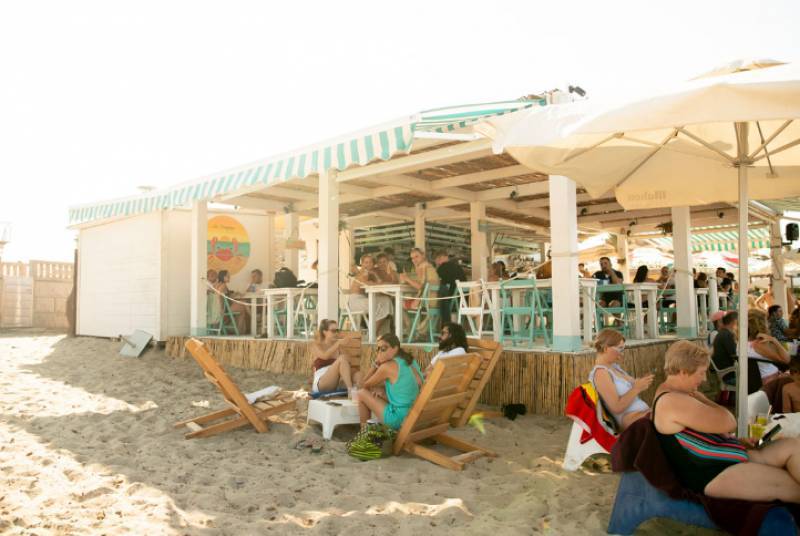 La Cangreja, much loved by pretty much anyone who’s ever been there, is also the only bar-restaurant of its kind in the whole Region of Murcia to be bestowed with the honour this year.
La Cangreja, much loved by pretty much anyone who’s ever been there, is also the only bar-restaurant of its kind in the whole Region of Murcia to be bestowed with the honour this year.According to Tapas magazine article, the specialties you have to try are the seafood tapa, the empanadilla preñá and the summer morcilla croquette. All accompanied by a good mojito, of course.
As well as its bar in La Manga, La Cangreja operates establishments in Cabo de Palos, La Azohía and San Juan de los Terreros which are all just as popular.
On the Condado de Alhama resort, the Community of Owners has agreed to take legal action against the Sareb Bank, Spain’s “bad bank” which was set up by the government in 2012 to acquire and manage the failing banks, toxic debts and assets amassed by the construction and banking sector after the 2008 property crisis.
The issue is that Sareb currently owns the Al-Kazar Shopping Centre on Condado but the locals who live there claim they are not keeping up with the maintenance of the place as they should be. There have been no lights in Al-Kazar for weeks now, the tiled areas have not been cleaned for months and there are numerous health and safety hazards in the complex.
Sareb acquired the Commercial Centre as part of the Polaris World property portfolio after the construction group collapsed and went into bankruptcy in 2016 with huge debts. Unless and until they fulfil their responsibility to run the property properly and efficiently, the Condado de Alhama board of presidents is asking if Al-Kazar business owners and local volunteers could spend some time installing lighting and cleaning the place up a bit, for the good of all who use it.
Lastly, and moving back to Mazarrón, an expat-run business there is being investigated by police after a 46-year-old British woman accused her boss, also from the UK, of sexually abusing her for the last year.

According to a statement that the woman filed at the Mazarrón police headquarters, the harassment began in the summer of last year, although she had been working there for the last two years. It all started when her male boss bought her some shorts and a top because “it was hot”, but it quickly escalated from there to “almost daily” incidents in which he would touch her breasts, her crotch and her backside; make indecent propositions; send her messages with sexual content and offer her money for oral sex, which she always refused, all while they were at work.
When the woman rebuffed him repeatedly, her sometimes went for months without paying her. It was only after the boss’s wife found out about the harassment and sexual abuse and the alleged victim was fired from her job that she approached police to file a report. She told police that the reason she hadn’t reported it before because she needed the job and the money.
Remember: Spain has hotline numbers dedicated to helping women who are the victims of domestic or sexual abuse. If you are being abused or harassed, or think you know someone who is, you can call Support for Women on 0034 900 100 009 or 0034 900 580 888, or phone the Gender Violence Hotline on 016 or 0034 900 161 161, or else go to your nearest police station.
Spain
Thankfully, the heat has eased off a little for the weekend but Spain positively boiled earlier in the week in the second heatwave of the summer, with temperatures climbing up to 46ºC in parts of the south of the country.
As if that wasn’t enough to contend with, a choking dust cloud driven by hot air from the Sahara swept over Spain, as well as Italy and France, on Tuesday and Wednesday, blanketing every available surface, turning the sky an eerie orange or grey, depending on the area you were in, and dramatically impacting air quality.
Large parts of the Mediterranean coast frequently experience these dust clouds, or ‘calimas’ as they are more commonly known in Spanish, but the Copernicus Atmosphere Monitoring Service (CAMS), which is responsible for tracking Saharan dust storms, confirmed that the one which hit Spain this week showed far “higher concentrations of particulate matter at the surface” than any of the previous episodes.
Hopefully you’ve dusted yourself off by now and it’s time to hit the beach for a relaxing weekend. With constant reminders of the dangerous of sun exposure, few people in Spain leave the house during the summer months without a high factor sunblock. But even the most diligent among us can still suffer a sunburn from time to time, so it’s important to know what to do, and indeed what not to do, if you get sunburnt.
 Not all sunburns are created equal and the most common, technically called solar erythema, usually results in nothing more than red skin and a few blisters. The body is remarkably proficient at healing itself in this way but the experts caution that skin actually has ‘memory’. Solar radiation causes damage to cellular DNA that, in the most serious cases, can lead to cancer.
Not all sunburns are created equal and the most common, technically called solar erythema, usually results in nothing more than red skin and a few blisters. The body is remarkably proficient at healing itself in this way but the experts caution that skin actually has ‘memory’. Solar radiation causes damage to cellular DNA that, in the most serious cases, can lead to cancer.If you are unfortunate enough to suffer a bad burn, you’ll undoubtedly hear of at least one or two of the countless home remedies doing the rounds by well-meaning but sadly misguided folk. The most widespread (and incorrect) advice is to apply ice or freezing cold water to the affected area, but this is a big mistake.
Applying ice to a burn can actually cause vasoconstriction, which is the narrowing of the blood vessels that can slow or block circulation.
Likewise, dermatologists advise against bursting blisters or tearing off peeling skin. And do not use common kitchen products like potato, tomato, milk, butter or olive oil to ease the sting. Not only is there no scientific proof that they help burns in any way, some can actually make the wound worse by infecting it, and others like toothpaste can further dry out the burn.
Instead, if you get a sunburn, the best course of action is to take an anti-inflammatory such as ibuprofen or paracetamol and wear comfortable, loose clothing to prevent rubbing the skin. It is also vitally important to drink plenty of water to stay hydrated.
Alicante
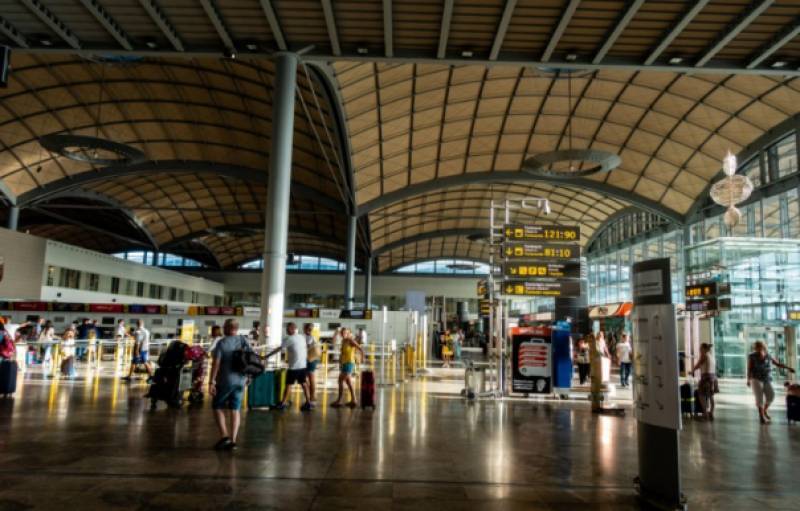
Dozens more flights will operate at Alicante-Elche airport this summer, and as the high season gets into full swing the authorities have added an extra shuttle bus between the city and the airport at peak hours of the day.
The airport bus service has just started operating 24 hours a day and from this week, four coaches rather three will ferry passengers from various points in Alicante city throughout July and August.
The decision was made primarily because of the roadworks along Avenida de Loring and Conde de Vallellano, which have forced the closure of the direct coach service between the bus station and Plaza Puerto del Mar. The additional airport shuttle should continue to operate until this bus route is back in action.
Line C6 picks up at Puerta del Mar and makes stops at the MARQ, Mercado Central, Plaza de los Luceros, avenidas de Salamanca, Óscar Esplá y Federico Mayo, Parque del Mar, San Gabriel and Euipo, Agua Amarga before arriving at Alicante airport.
The first departure from the Puerta del Mar stop is at 11.20pm, the second at 12.20am, and every hour thereafter until 6.20am. From there, departures are made every 20 minutes until 10.20 pm. A one-way ticket costs 3.85 euros while a 10-trip bus pass costs 12 euros.
The ancient yet controversial traditions of bullfighting and bull runs have been getting a lot of airtime lately as Spain fights back against needless animal abuse and neglect and the issue has hit the headlines in Alicante this week after a bull tragically drowned during one such event.
The annual Bous a la Mar festivities in Denia celebrates the municipality’s patron saint and the goal of the main event is actually to taunt the bull into jumping into the water, so runners draw it to the edge of the arena before escaping into the sea themselves.
But this year, one panicked animal ploughed through the crowds into the surf and, while there was a boat on hand to drag the bull back to safety, it was dead by the time it reached dry land.
🐃🌊🇪🇸 #BousALaMar | Los toros a la mar son de especial crueldad, estos animales no estan acostumbrados al agua y aún así se les acosa e incita a saltar al mar.
— AnimaNaturalis (@AnimaNaturalis) July 10, 2023
⚠️ Hoy ha muerto uno ahogado.
📍Dénia • Sábado 8 julio 2023
🎬 @AnimaNaturalis y @CAS_Int pic.twitter.com/ffIhnQtICU
According to AnimaNaturalis, whose members posted the shocking video of the bull fighting against the tide, these celebrations “are especially cruel. These animals are not used to water and even so they are harassed and encouraged to jump into the sea.”
At the San Fermines bullrunning festival up in Pamplona in the north of Spain, the bulls have half a chance to get their revenge, and so far 23 people have needed to be taken to hospital after being trampled by a bull or skewered by their horns. Of course, the animals are still sacrificed at the end of the run and it’s cruel to make them run through the hot, busy, paved streets in the first place.
 The latest legend coming to Alicante this summer? No other than Sir Tom Jones! The Welsh songster, who turned 83 this year and whose career in music spans 60 years, will be performing live at the Alicante Bullring on August 1 – surely a better use of the bullring than a playground for matadors! This is just one date on Sir Tom’s busy summer touring schedule, which sees him croon and swoon his way across the United Kingdom and 11 European countries, and tickets are still available to buy!
The latest legend coming to Alicante this summer? No other than Sir Tom Jones! The Welsh songster, who turned 83 this year and whose career in music spans 60 years, will be performing live at the Alicante Bullring on August 1 – surely a better use of the bullring than a playground for matadors! This is just one date on Sir Tom’s busy summer touring schedule, which sees him croon and swoon his way across the United Kingdom and 11 European countries, and tickets are still available to buy!Check out the Costa Blanca What’s On and Where to Go Facebook group to see more things to do around Alicante province!
Andalucía
The beach is the place to be in Andalucía this week. Certainly not in Seville or Córdoba, where temperatures have got up to highs of 46ºC. No, it’s much better down by the coast, where temperatures remain in the hot but manageable 30s.
Or is it? The app ‘MedusaApp’, which lets you check which beaches jellyfish have washed up on and, more importantly, the exact number that are present, has revealed that Almería province has more jellyfish than most of the other Spanish coasts.
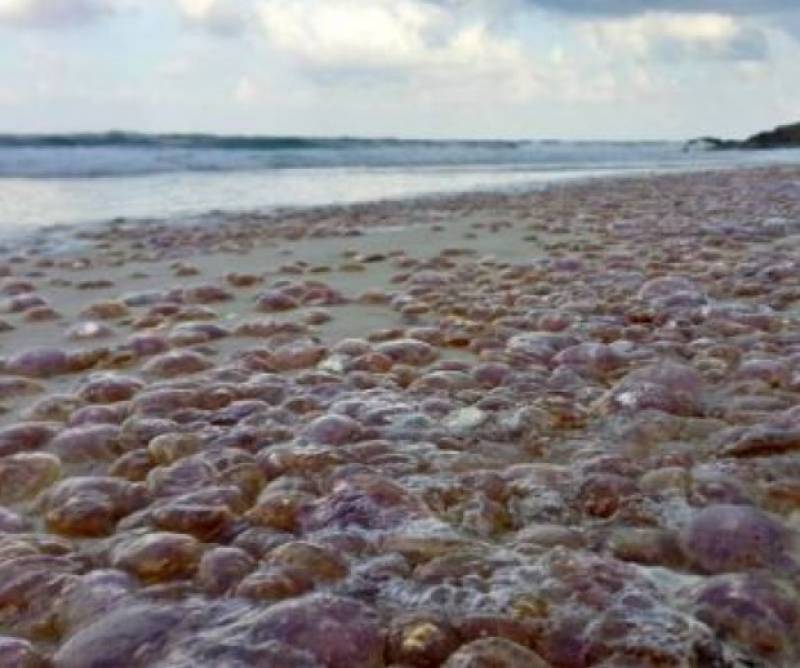 Contrary to popular belief, it’s actually ocean currents and wind patterns, rather than increasing temperatures, that determine the number of jellyfish in Spanish waters. Whatever the reason, it seems that certain beaches in Andalucia are overrun with these stinging invertebrates during the summer months, and this year it’s Almería’s turn to bear the brunt of it.
Contrary to popular belief, it’s actually ocean currents and wind patterns, rather than increasing temperatures, that determine the number of jellyfish in Spanish waters. Whatever the reason, it seems that certain beaches in Andalucia are overrun with these stinging invertebrates during the summer months, and this year it’s Almería’s turn to bear the brunt of it.Jellyfish stings can range from mildly irritating to life-threatening, depending on the species. In Almería, the rather creepily named – but perhaps aptly in this case – Playa de los Muertos, or Beach of the Dead in English, had the most jellyfish with more than half a dozen sightings being reported.
Las Marinicas and Los Barquicos in the municipality of Carboneras are also among the most infested, along with Venta del Bancal and Rumina in Mojacar and El Playazo and Vera Playa in Garucha. On the coast of the Cabo de Gata-Níjar Natural Park, there have been numerous sightings in Cala Palmito, San José and Piedra Galera, while several jellyfish have been reported in Roquetas de Mar, Balanegra and Almerimar.
Over in Málaga, there was a gruesome discovery made this Thursday when the body of a man between 60 and 70 years was found facedown on a beach in Torre del Mar in the municipality of Vélez-Málaga.
Police got the call at around 7.30am saying that the man had been spotted in the area of the promenade west of Torre del Mar and that he seemed to have drowned. While early reports are still unconfirmed, it is thought the man was a tourist to the area, but his nationality is unknown.
And to finish off, one Málaga town has resorted to cutting off its water supply for 18 hours a day in the face of depleting reserves of water. Almost 400,000 Costa del Sol residents have been subjected to water restrictions this summer, but those 4,000 who are located in the municipality of Casabermeja have it worse than most as, for the past two weeks or so, the town hall has been cutting off running water at night to conserve supplies.
Casabermeja was already blighted by dramatic and destructive wildfires last summer. As of this week, they’ve kicked the water restriction measures up a notch further and homes and businesses now only have access to tap water for six hours each day, from around 2pm to 8pm.
In all of the province of Málaga, persistent drought means reservoirs are at just 30% capacity. The popular holiday destination of Benalmádena decided to reduce street washing by 35% and the irrigation of parks and gardens by 10%, while the settings of the beach showers will also be modified so that they don’t run for so long, saving an estimated 330,000 litres of water per week.
In coastal areas with a high influx of summer visitors such as Rincón de la Victoria and Algarrobo, beach showers have been shut off altogether and inland, Moclinejo has decided to cut off the general water supplies between midnight and just before dawn.

You may have missed…
- British woman cuts the throat of an Ibiza hotel manager.
Police are hunting for a British woman in Ibiza who is accused of slitting a hotel manager’s throat with a glass because of a dispute over the bar tab. - Panic in Huelva as enormous whale splashes by the shore.
A relaxing day at La Antilla beach in the province of Huelva dissolved into chaos on Tuesday July 11 with the arrival of what appeared to be a huge killer whale just metres from the shore. - Rent an e-bike in Murcia, a green alternative to getting around.
See the beautiful Region of Murcia and help save the planet at the same time on a folding electric bike! - Woman gives birth in a van in Torre Pacheco.
Emergency services were called out to attend to a woman who had gone into labour in a van in the middle of the road in Torre Pacheco. - New ground-breaking nature restoration law approved for Spain and EU.
After several months of incessant debate, the European Commission has this week passed its ground-breaking nature restoration law which will apply recovery measures to 20% of the EU’s land and sea by 2030.
And that’s it for this week. Thanks for getting this far, and remember if you do want to leave any feedback, all suggestions big and small are welcome at editor@spaintodayonline.com. We do what we can to read and answer all communications, although it’s not always possible. Still, we’d love to hear your thoughts about the bulletin with them objective of making it as good as it can be for you.
See ya!
Contact Murcia Today: Editorial 000 000 000 /
Office 000 000 000




















